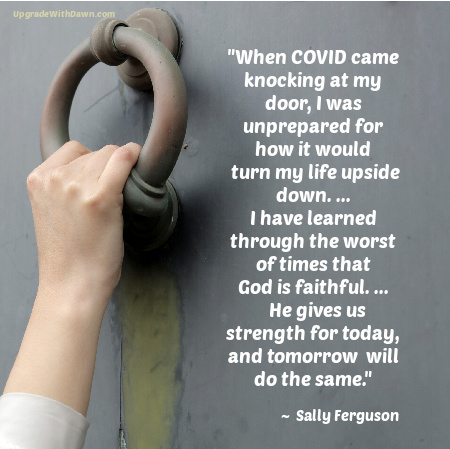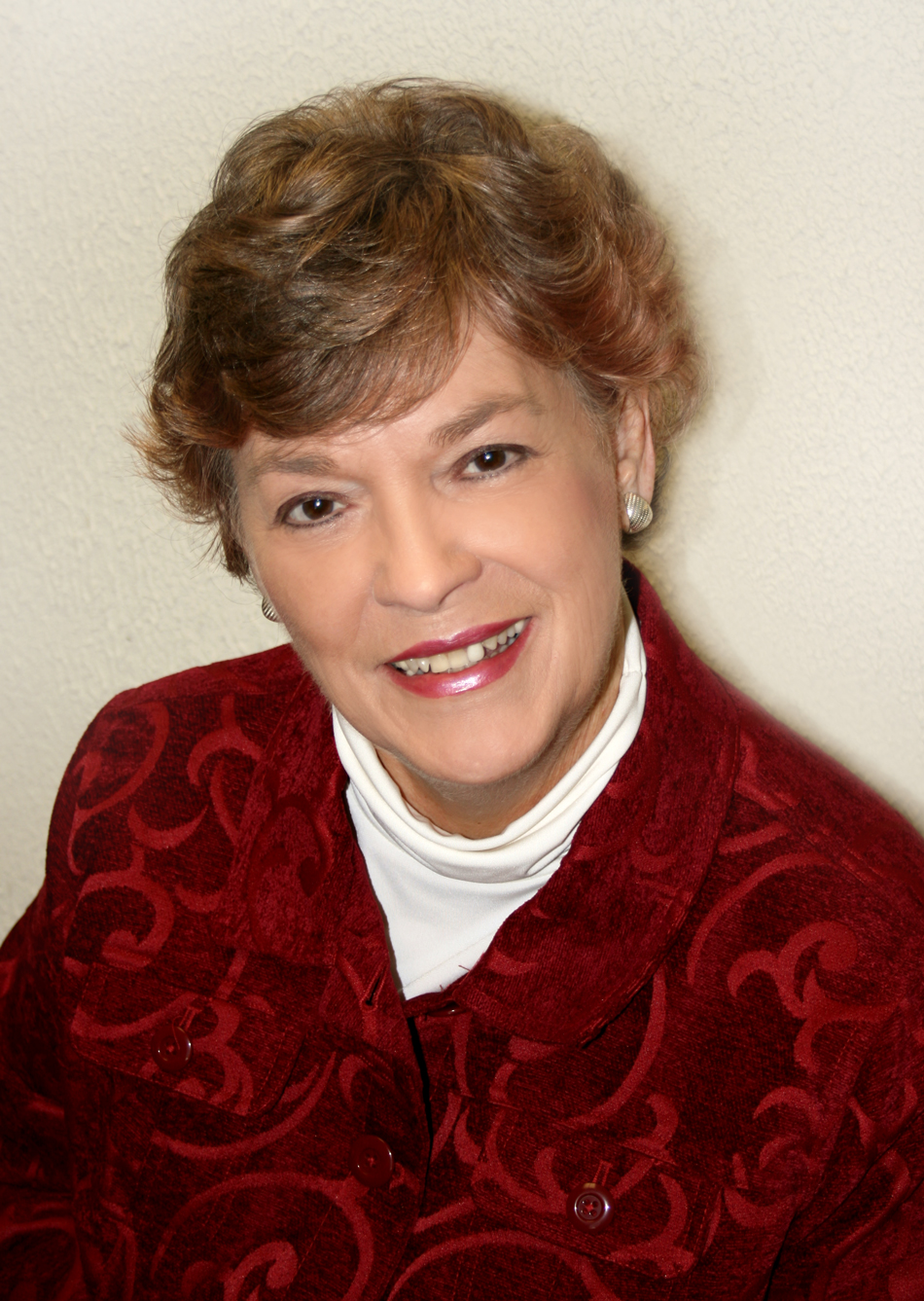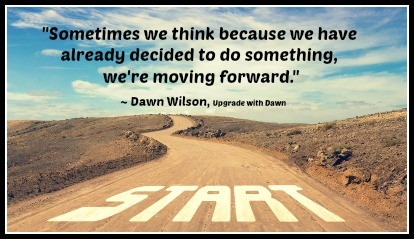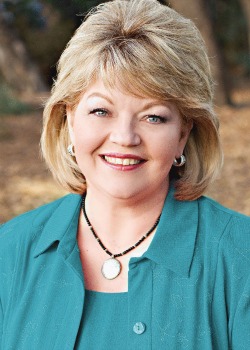Help! I Feel Insecure!
Kathy Collard Miller is a truth seeker and truth teller, and she finds the truth that guides her life in the Word of God. In this Christian Growth UPGRADE, she offers wise, biblical counsel about insecurity.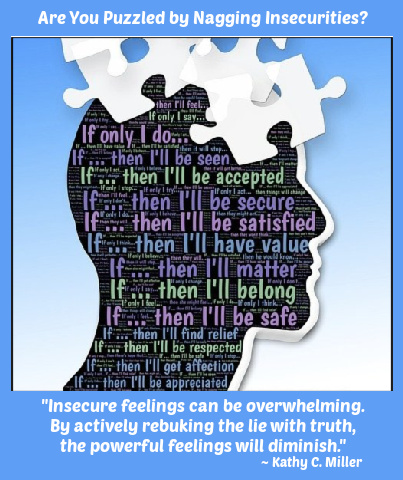
"Feeling insecure is a common emotion and an attitude stemming from believe we are inferior," Kathy says. "What can we do about it?"
I (Dawn) never realized how insecure I was growing up, and I couldn't figure out the puzzle to make my insecurity go away! But just as Kathy shares, I finally discovered the biblical truths that helped me overcome my faulty beliefs.
Kathy continues . . .
I grew up thinking of myself as always guilty and always imperfect. I even thought God agreed with me.
But after I became a Christian at age 18, God began the slow process of showing me how He viewed me—as forgivable, worthwhile, and unconditionally loved. Little by little, my insecurity gave way to security.
Truth from several verses were a key part of this transformation.
1. Nothing can separate me from God—even my sin.
My insecurity had a lot to do with thinking God was waiting to see how well I performed before making my salvation "official."
Then I came across Ephesians 1:13a:
When you believed, you were marked in him with a seal, the promised Holy Spirit (NIV).
When I was a teenager, it was popular to put melted wax on an envelope to seal it. I didn’t know that in biblical times, a scroll was closed with a wax seal to not only authenticate the scroll but also make sure no one broke open the important document. It was secure and safe from the information being changed by others.
In the same way, the gift of the Holy Spirit to us at the moment of salvation makes us secure and safe from the heart being deprived of its eternal spiritual inheritance.
2. God’s opinion of me is more important than the opinions of others.
A large part of my insecurity resulted from basing my worth and value upon the opinions of others. It won’t surprise you I’m a people pleaser.
I needed the approval of other people.
But Jesus’s example spoke volumes to me. At one point when He was pointing out why the Pharisees wouldn’t believe in Him, Jesus told them:
How can you believe since you accept glory from one another but do not seek the glory that comes from the only God? (John 5:44 NIV).
When I realized I was more interested in someone else’s “glorious” opinion of me than God's, I knew the reason I was insecure: people’s opinions were fickle. I couldn’t control them or convince them.
When I became convinced God’s love for me never changed, I felt secure because Jesus died on the cross and declared, “It is finished.” It could never be changed.
3. God Is Faithful.
Insecurity is fueled by thinking I have to make God look good by my good behavior.
I carry the weight of God’s reputation on my shoulders. If I falter, I’m responsible for how other people view God.
This fear creates tension and stress.
That lie was dissipated for me when I read 2 Thessalonians 3:34:
But the Lord is faithful, and he will strengthen you and protect you from the evil one. We have confidence in the Lord that you are doing and will continue to do the things we command (NIV).
Interestingly, the Thessalonian believers were far from perfect. Paul was writing to them to get them back on the right path by reminding them God was the one who faithfully held them, strengthened them, and protected them.
Paul’s confidence wasn’t in believers “self-made security” but in God’s faithfulness. Then God would get the glory by keeping the true believers secure in Him.
How to TRANSFORM Insecure Feelings & Attitudes
1. Look for the underlying causes.
Most often we are insecure because of wounds from our childhood and teen years. The comments of others and how we were treated communicated we weren’t valuable and important.
By rejecting those lies, we can push against acting as if they are true.
2. Use spiritual battle.
Insecure feelings can be overwhelming. By actively rebuking the lie with truth, the powerful feelings will diminish.
Say it out loud—“My Father God, you tell me I am valuable and important to you. That’s why you sent Jesus to die for me. I didn’t deserve His sacrifice but you made it possible because of your unconditional love for me.”
Repeat that truth over and over again, even if it’s many times a day.
3. Rehearse who God is.
Our security is based totally on the nature of God. He is faithful. He devised a salvation plan He wants to keep. He has a hold of you and me that cannot be broken.
We are secure in Christ because it brings glory to Him.
It really is possible to feel less insecure and more secure because of God’s unfathomable love!
What truth about your security will you repeat over and over again by faith?
 Kathy Collard Miller loves to help women trust God more through her 58 books and speaking in 35 states and nine foreign countries. Kathy’s newest
Kathy Collard Miller loves to help women trust God more through her 58 books and speaking in 35 states and nine foreign countries. Kathy’s newest  book, co-written with her husband, Larry, is God’s Intriguing Questions: 60 New Testament Devotions Revealing Jesus’s Nature. Her website/blog is www.KathyCollardMiller.com; and check out her Amazon author page: https://www.amazon.com/Kathy-Collard-Miller/e/B001KMI10S/
book, co-written with her husband, Larry, is God’s Intriguing Questions: 60 New Testament Devotions Revealing Jesus’s Nature. Her website/blog is www.KathyCollardMiller.com; and check out her Amazon author page: https://www.amazon.com/Kathy-Collard-Miller/e/B001KMI10S/
Graphic adapted, courtesy of John Hain at Pixabay.
 Post a Comment → Posted on
Post a Comment → Posted on  Tuesday, March 9, 2021 at 9:34AM
Tuesday, March 9, 2021 at 9:34AM  Childhood wounds,
Childhood wounds,  God is Faithful,
God is Faithful,  Insecure,
Insecure,  Insecurities,
Insecurities,  Insecurity,
Insecurity,  Nature of God,
Nature of God,  People Pleasing,
People Pleasing,  Performance,
Performance,  Rebuke Lies,
Rebuke Lies,  Sealed by the Holy Spirit,
Sealed by the Holy Spirit,  Secure in Christ Upgrade Your Life
Secure in Christ Upgrade Your Life  Spiritual Growth
Spiritual Growth 




